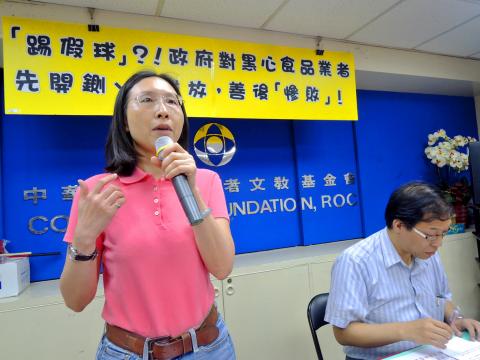The Consumers’ Foundation yesterday accused the government of “fixing” its fights against companies implicated in food scandals, citing the recent reinstatement of Chyuan Shun Food Enterprise Co’s rice dealer license and annulment of a fine given to edible oil manufacturer Chang Chi Foodstuff Factory Co.
In December last year, the Council of Agriculture revoked the license of Chyuan Shun, the manufacturer of the Shanshui Rice (山水米) brand, after it was found to have mixed imported Vietnamese rice with domestically grown rice and sold the product as Taiwanese rice.
“It appears the move was simply part of the council’s ‘match-fixing’ plan, as it deliberately created a procedural flaw in administering the punishment that provided a justifiable cause for Chyuan Shun to file an appeal with the Executive Yuan’s Petitions and Appeals Committee and for the committee to reinstate the firm’s license,” foundation chairman Mark Chang (張智剛) said.

Photo: Hsieh Wen-hua, Taipei Times
The committee decided that the council had failed to give Chyuan Shun a chance to make improvements before withdrawing its license.
The Operational Guidelines Governing the Penalties on Violation of the Food Administration Act (違反糧食管理法案件處分裁量作業要點) stipulate that a license can be pulled only after a company has been fined four times within a year.
“The council imposed three fines on the rice dealer on Sept. 23 last year based on the test results of three rice samples it collected on Aug. 29.
Although the fourth punishment was handed out on Oct. 21, the rice sample it tested had been taken on Aug. 19, which meant Chyuan Shun was not even given a chance to correct its errors,” the committee said at the time.
Withdrawing the license was obviously just “a feint designed to make people think that the government was doing its job” because there was no way the council would not have known that the fourth punishment was problematic, Chang said.
The government’s “just-for-show strategies” were clearly demonstrated by the Ministry of Health and Welfare’s cancelation of a NT$1.85 billion (US$62 million) fine imposed on Chang Chi last year over an adulterated oil scandal.
The ministry made the decision earlier this month on the grounds that the fine violated the double jeopardy principle, given that a district court had sentenced the Chang Chi chairman Kao Cheng-li (高振利) to 16 years in prison and fined him NT$50 million in December last year.
“The foundation agrees with the principle of double jeopardy, but the government ought to make some changes when the administrative law and the criminal law are tying each other’s hands,” Chang said. “Otherwise, criminals will always prevail.”
Chang urged the health ministry, the Ministry of Justice, and the Executive Yuan’s Consumer Protection Department to improve consumer protection efforts by putting administrative punishments before criminal ones in cases where an offense is punishable by both, or by raising the upper limit on criminal fines to an extent that the penalties account for a “deterrent proportion” of a company’s illegal gains.

Chinese Nationalist Party (KMT) Chairman Eric Chu (朱立倫), spokeswoman Yang Chih-yu (楊智伃) and Legislator Hsieh Lung-chieh (謝龍介) would be summoned by police for questioning for leading an illegal assembly on Thursday evening last week, Minister of the Interior Liu Shyh-fang (劉世芳) said today. The three KMT officials led an assembly outside the Taipei City Prosecutors’ Office, a restricted area where public assembly is not allowed, protesting the questioning of several KMT staff and searches of KMT headquarters and offices in a recall petition forgery case. Chu, Yang and Hsieh are all suspected of contravening the Assembly and Parade Act (集會遊行法) by holding

PRAISE: Japanese visitor Takashi Kubota said the Taiwanese temple architecture images showcased in the AI Art Gallery were the most impressive displays he saw Taiwan does not have an official pavilion at the World Expo in Osaka, Japan, because of its diplomatic predicament, but the government-backed Tech World pavilion is drawing interest with its unique recreations of works by Taiwanese artists. The pavilion features an artificial intelligence (AI)-based art gallery showcasing works of famous Taiwanese artists from the Japanese colonial period using innovative technologies. Among its main simulated displays are Eastern gouache paintings by Chen Chin (陳進), Lin Yu-shan (林玉山) and Kuo Hsueh-hu (郭雪湖), who were the three young Taiwanese painters selected for the East Asian Painting exhibition in 1927. Gouache is a water-based

Taiwan would welcome the return of Honduras as a diplomatic ally if its next president decides to make such a move, Minister of Foreign Affairs Lin Chia-lung (林佳龍) said yesterday. “Of course, we would welcome Honduras if they want to restore diplomatic ties with Taiwan after their elections,” Lin said at a meeting of the legislature’s Foreign Affairs and National Defense Committee, when asked to comment on statements made by two of the three Honduran presidential candidates during the presidential campaign in the Central American country. Taiwan is paying close attention to the region as a whole in the wake of a

OFF-TARGET: More than 30,000 participants were expected to take part in the Games next month, but only 6,550 foreign and 19,400 Taiwanese athletes have registered Taipei city councilors yesterday blasted the organizers of next month’s World Masters Games over sudden timetable and venue changes, which they said have caused thousands of participants to back out of the international sporting event, among other organizational issues. They also cited visa delays and political interference by China as reasons many foreign athletes are requesting refunds for the event, to be held from May 17 to 30. Jointly organized by the Taipei and New Taipei City governments, the games have been rocked by numerous controversies since preparations began in 2020. Taipei City Councilor Lin Yen-feng (林延鳳) said yesterday that new measures by